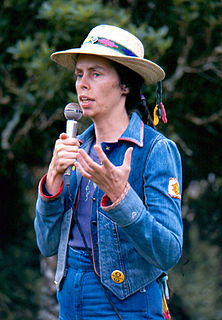A Quote by Josette Sheeran
If any good comes out of the current famine in the Horn of Africa - amidst the pictures of mothers carrying dying babies at their shrivelled breasts and hollow-eyed children with swollen bellies and matchstick limbs - it will be galvanising the world on the need to ensure access to nutritious food for the world's most vulnerable people.
Related Quotes
Given Freudian assumptions about the nature of children and the biological predestination of mothers, it is unthinkable for mothers voluntarily to leave their babies in others' care, without guilt about the baby's well-being and a sense of self-deprivation. Mothers need their babies for their own mental health, and babies need their mothers for their mental health--a reciprocal and symbiotic relationship.
There is more food in the world than we could possibly use. There's a huge surplus of food per capita, but it's locked away and rotting in the storehouses of the Western world, whereas in the East, in many parts of Africa, India and South America, people are starving to death. Millions of people are dying of starvation in a time in which there is a huge surplus of food.
With 28 million children eating lunch at school every day in the United States, I believe government has an obligation to ensure parents have some peace of mind when they send their children off to school in the morning, .. Since children are particularly vulnerable to foodborne illness, schools must be vigilant in their efforts to ensure that cafeterias are not putting children at risk. These changes in law will support parents who want to work with school principals and food-service directors to ensure a safe environment.
There is no doubt that the princess did become a queen---not only on the screen. One of the most loved, one of the most skillful, one of the most intelligent, one of the most sensitive, charming actresses---and friends, in my life---but also in the later stages of her life, the UNICEF ambassador to the children of the world. The generosity, sensitivity, the nobility of her service to the children of the world and the mothers of the world will never be forgotten.
In most of the world, we have only small remnants of the wildlife that once existed. Africa has the most astonishing wildlife still. Now Africa is modernizing. In the next twenty years, Africa is modernizing economically, and one of two things is going to happen. Either Africa will be just like the rest of the world and it's say goodbye to wildlife. Or, we can learn from the mistakes made in the rest of the world.
With enough money and international coordination, we can push incoming asteroids out of Earth's path. We might even be able to bring back extinct animals in the lab. The problem really isn't scientific - it's cultural. We aren't yet able to coordinate ourselves as a global civilization to do something simple like bring food to a famine-stricken region. We can actually use current satellite technologies to predict where famine will strike next, but we can't get food there - usually for political reasons.
A society that places a low value on its mothers and the process of birth will suffer an array of negative repercussions for doing so. Good beginnings make a positive difference in the world, so it is worth our while to provide the best possible care for mothers and babies throughout this extraordinarily influential part of life.
Humans used to desire love, money, food, shelter, safety, peace and freedom more than anything else. The last 30 years have changed us. Now people want to have a good job, and they want their children to have a good job. This changes everything for world leaders. Everything they do - from waging war to building societies - will need to be carried out within the new context of the need for a good job.

































